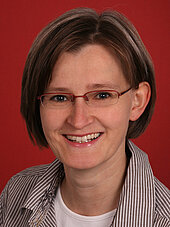Krutsch, Monika
Congratulations on passing the viva voce on 10 December 2014.
Dissertation topic:
"Variations of the Self - Biographical Constructions in the Heterogeneity and Normativity of Orientation Patterns."
Funding:
2001-2004 in the Interdisciplinary Research Training Group at the University of Würzburg
"Zur Wahrnehmung der Geschlechterdifferenz in religiösen Symbolsystemen".
Contact address at the University of Würzburg:
Chair of Religious Education
Institute of Practical Theology
University of Würzburg
Paradeplatz 4
97070 Würzburg
Tel: (0931) 313131
Fax: (0931) 313132
Email to Ms Krutsch
First supervisor: Prof. Dr Hans-Georg Ziebertz
Further supervisors:
Class in the Graduate School: "Education and Culture"
Doctorate in the Graduate School since SS 2008.
Abstract:
1. occasion
Heterogeneous and normative orientation patterns in the context of individual life courses form the starting point of the qualitative-empirical study on the life organisation of women of rural Catholic origin. While pedagogical biographical research understands current life courses as biographical achievements (cf. Alheit, 1990), sociological life course research primarily emphasises interdependent processes that overtly or covertly structure the life course (cf. Born/Krüger/Lorenz-Meyer, 1996). Contemporary lifestyles must be seen in the context of multiplied and at the same time normative orientation patterns.
In view of rural-religious structures of persistence (cf. Becker, 1997a/b) as well as gender- and generation-specific structuring processes (cf. Dausien, 1996; 1997), the potential for interweaving structure and norm in the life course of two generations of women with rural and Catholic origins is becoming increasingly apparent, which is why the biographical personal achievement examined here is analysed in the confrontation with rural, intergenerational and church-religious traditions.
2. research question
The study examines the research question of how women of two generations with a rural Catholic background organise their lives in the context of heterogeneous and normative orientation patterns. The role of gender-specific, rural, intergenerational and religiously connoted orientation patterns in the context of current lifestyles is investigated and biographical resources are analysed.
3. method
The study uses a qualitative-empirical method based on guided interviews and follows the methodological procedure of 'Revised Grounded Theory' (Strauss/Corbin, 1996) in the evaluation. The survey comprises fourteen women of rural and Catholic origin from two generations. Seven mother-daughter pairs were interviewed separately.
The qualitative survey of individual lifestyles in the context of heterogeneous and normative orientation patterns was obtained via narratives of biographical experiences of discrepancy. The conceptualisation of biographical achievements in the context of social structuring was carried out with the help of action-theoretical and sociological concepts, which were used in the evaluation process to form types of biographical organisation.
The role of rural or religiously connoted as well as gender-specific or intergenerational orientation patterns was determined by reconstructing interweaving processes in dealing with experiences of discrepancy.
4. empirical findings
The respondents' own biographical achievements can be differentiated into four different forms (self-determined, rational, simplified, accidental), whereby the subjective attitude towards action or solution orientation plays a decisive role in shaping them. In addition, the identified types of biographical personal achievement differ in terms of the underlying self-concept, the subjectively perceived capacity for action and the various biographical modes of organisation that come into play.
The reconstruction of relevant orientation patterns revealed a structurally effective role in some of the life courses analysed, both in the form of subjective values and the relevance of social relationships. Similarly, orientation patterns with gender-specific connotations in particular sometimes play a discrepant role in biographical decision-making situations.
A pronounced attachment to one's homeland is often the reason why deficiency structures in rural regions are perceived as structural constraints in the life course. Church-religious attitudes can also lead to inner conflicts and social constraints in lifestyle.
Internal conflicts and external constraints can be found in female life courses through the relationship between the sexes and between the generations. The strength of these social relationships means that such experiences of discrepancy are not always resolved by the respondent group in the course of their lives.
For highly integrated women in the village and church community, the church-village social structure becomes a point of relevance for internal conflicts and external pressures. Similarly, individual strokes of fate in particular become biographical ambivalences in the course of the interviewees' lives when their behaviour is regulated by gender.
On the other hand, problem-solving approaches also point to the performative power of female life courses, which was brought to light in this study.
5. classification in the research context
In view of the self-concepts identified, which are based on biographical personal achievements, the study provides empirical illustrative material of diverse and variable self-images, which are assumed in current self-concept research.
In addition, subjective attitudes towards action and solution-orientation were identified as essential parameters of biographical achievements for biographical research.
The results also make a contribution to the discussion of biographical resources of current lifestyles. In dealing with biographical experiences of discrepancy, an authentic self-concept, work on the self and the ability for discursive reflexivity were identified as biographical resources.
In the context of gender research, the four types of biographical organisation point to reproducing and modifying processes of social relations over the course of life. While signs of controlled modification could be identified in the context of self-determined biographical organisation and implicit modification in the context of random biographical organisation, processes of reproduction can be seen in the other two forms of biographical organisation. Rational biographical organisation can be evaluated as reflexive reproduction. Simplified biographical organisation, on the other hand, can be read as the implicit reproduction of social conditions.






